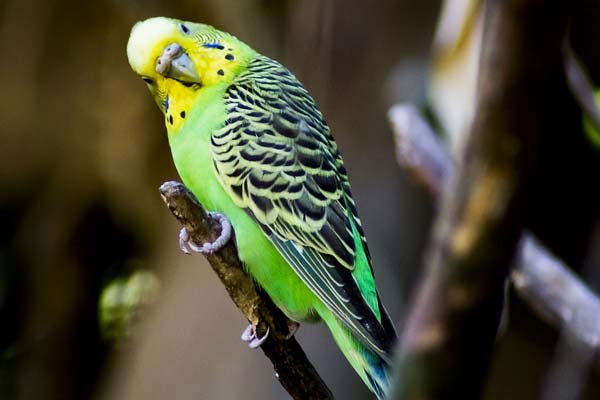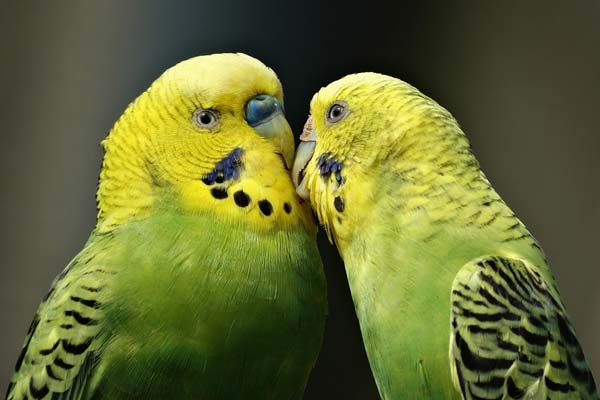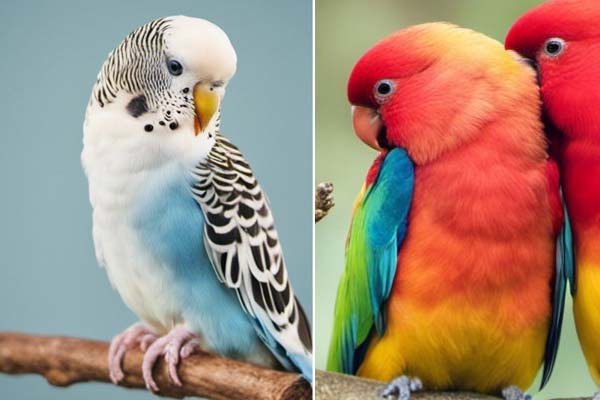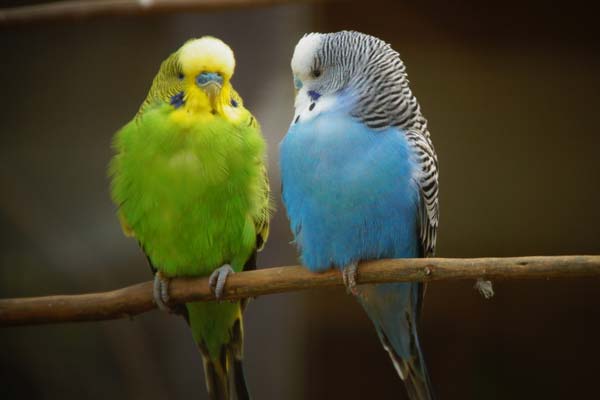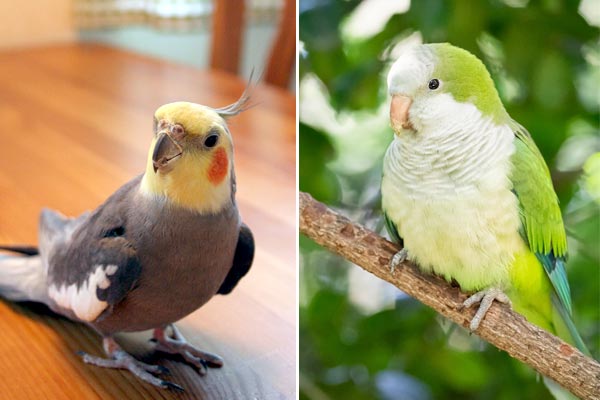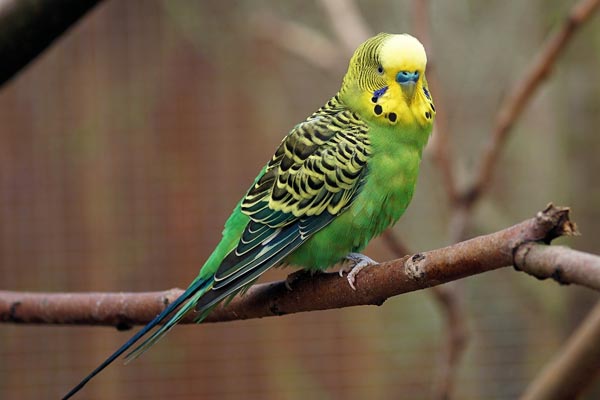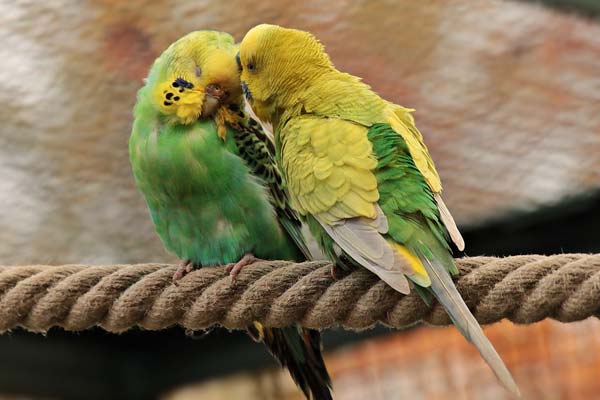Why Your Budgie is Making Squeaking Noises: Understanding the Causes
Budgies are popular pets known for their charming personalities and beautiful plumage. However, it can be concerning when they start making unusual noises, such as squeaking or clicking sounds.
There could be various reasons if you’re wondering why your budgie is making squeaking noises.
One possible reason for squeaking noises in budgies is tracheal disease, which affects the bird’s airway. This condition can cause wheezing, coughing, labored breathing, and squeaking noises.
Another possible cause is a respiratory infection or airsac mites, which can lead to wheezing and other respiratory symptoms.
Additionally, budgies lacking iodine may develop a swollen thyroid gland, leading to compressed airways and squeaking noises.
Understanding Budgie Squeaking Noises
Budgies are known for chirping and chattering, but sometimes they can make squeaking noises that may sound abnormal.
Understanding the reasons behind these noises is essential to ensure your budgie’s health and well-being.
Differentiating Normal Vocalizations from Abnormal Squeaking Noises
Before jumping to conclusions, it is crucial to differentiate between normal and abnormal budgie vocalizations. Budgies make various sounds to communicate, express emotions, and warn flock members of danger.
Small chirps and chatters are typical for contented budgies, while loud screeches and screams may indicate distress or fear.
Health-Related Causes for Squeaking Sounds
Several health-related issues can cause budgies to make squeaking noises. These include:
Tracheal Disease and Respiratory Concerns: Budgies may wheeze or click sounds when breathing. Other respiratory concerns, such as pneumonia or bronchitis, may cause similar symptoms.
Mites, Worms, and Other Parasitic Infections: Parasitic infections can cause budgies to make squeaking noises due to discomfort and pain.
Goiter and Nutritional Deficiencies: Budgies with goiter or nutritional deficiencies may make clicking or squeaking sounds due to a compressed airway caused by a swollen thyroid gland.
Fungal and Bacterial Infections: Fungal and bacterial infections can cause respiratory problems in budgies, leading to squeaking noises.
Foreign Objects: Budgies may swallow foreign objects that can cause respiratory distress and squeaking noises.
Behavioral Reasons for Budgie Squeaking
Budgies may also make squeaking noises due to various behavioral reasons, including:
Mating and Courtship Behaviors: Budgies may make squeaking noises during courtship and mating behaviors.
Parental Care and Feeding of Babies: Female budgies may make squeaking noises while feeding their babies.
Male Budgie Behaviors: Male budgies may make squeaking noises to establish dominance or attract a mate.
Expressing Contentment and Happiness: Budgies may make small squeaking noises to express contentment and happiness.
Addressing Budgie Squeaking Noises
If a budgie starts making squeaking noises, it is crucial to take immediate action to identify and address the underlying cause. Here are some steps that can be taken to address budgie squeaking noises:
Consultation with a Vet for Proper Diagnosis and Treatment
The first and most important step when a budgie starts making squeaking noises is to consult a veterinarian specializing in avian medicine. The vet will examine the bird to identify the cause of the squeaking noises. Based on the diagnosis, they may suggest medication, surgery, or other treatments to resolve the problem.
Adjusting Budgie’s Diet for Optimal Nutrition
In some cases, budgie squeaking noises may be caused by a nutritional deficiency. Providing the budgie with a balanced and nutritious diet is crucial to address this issue. Ensure that the budgie has access to a diverse range of fruits, vegetables, grains, and proteins and constant access to fresh water.
Providing Suitable Treatment for Specific Health Issues
Suppose the vet determines that a specific health issue, such as a respiratory infection or mites, causes the budgie’s squeaking noises. In that case, providing the bird with suitable treatment is crucial. This may include medication, topical treatments, or other interventions, as the vet recommends.
Creating a Safe and Comfortable Environment
Budgies require a safe and comfortable environment to thrive. This includes a cage appropriately sized for the bird, with plenty of space for flying and perching. The cage should also be equipped with appropriate toys, perches, and other accessories to keep the bird mentally stimulated and engaged.
Fulfilling Behavioral Needs Through Toys, Interaction, and Mental Stimulation
Budgies are social creatures that require interaction and mental stimulation to stay healthy and happy. This may include providing the bird with toys to play with, interacting with the bird, and providing opportunities to exercise and explore its environment.
FAQs: Understanding Budgie Squeaking Noises
Budgies are naturally chatty birds, and they communicate through various sounds. However, sometimes these sounds can be concerning, especially if they are new or unusual.
Here are some frequently asked questions about budgie squeaking noises that can help you understand what your feathered friend is trying to tell you.
Interpreting the Meaning Behind Different Noises
Budgies make a variety of noises, and each sound has its meaning. Here are some common sounds and what they might indicate:
- Chirping: This is a happy sound, which usually means your budgie is content and relaxed.
- Singing: Singing is another happy sound, and it often means that your budgie is feeling playful and energetic.
- Hissing: Hissing can be a warning sound, and it may indicate that your budgie is feeling threatened or scared.
- Squeaking: Squeaking can indicate respiratory distress or other health issues. If your budgie is making persistent squeaking noises, taking them to a vet for a check-up is essential.
Identifying Normal Sounds vs. Potential Problems
It’s important to distinguish between normal sounds and potential problems. Here are some common sounds that are normal for budgies:
- Beak clicking: Budgies often click their beaks together as a sign of contentment.
- Wing flapping: Budgies often flap their wings when excited or playing.
- Purring: Some budgies will make a soft purring noise when feeling relaxed and comfortable.
If your budgie is making any new or unusual sounds, it’s essential to monitor them closely and take them to a vet if you are concerned.
Explaining Squeaks During Flight, Eating, and Sleeping
Budgies may also make squeaking noises during certain activities, such as flying, eating, or sleeping. Here’s what these sounds might mean:
- Squeaking during flight: If your budgie makes squeaking noises while flying, it may indicate respiratory distress. Monitor their breathing and take them to a vet if you are concerned.
- Squeaking during eating: Budgies may make squeaking noises if they are excited or trying to communicate with other birds.
- Squeaking during sleeping: Sometimes, budgies make soft squeaking noises. This is usually nothing to worry about, and it is a sign that your budgie is having a pleasant dream.
Conclusion
Budgies’ squeaking noises can be caused by health or behavioral factors. Tracheal disease, respiratory infections, or nutritional deficiencies are common health-related issues. Behavioral reasons include courtship behaviors and parental care. Differentiating normal sounds is vital.
Immediate action is crucial; consult an avian vet for diagnosis and treatment. Adjusting the diet, providing suitable treatment, and a comfortable environment help. Interaction with the budgie and fulfilling its behavioral needs with toys and mental stimulation is essential.
Monitor unusual sounds closely and seek professional advice. Understanding budgie noises ensures their well-being and a happier life.

